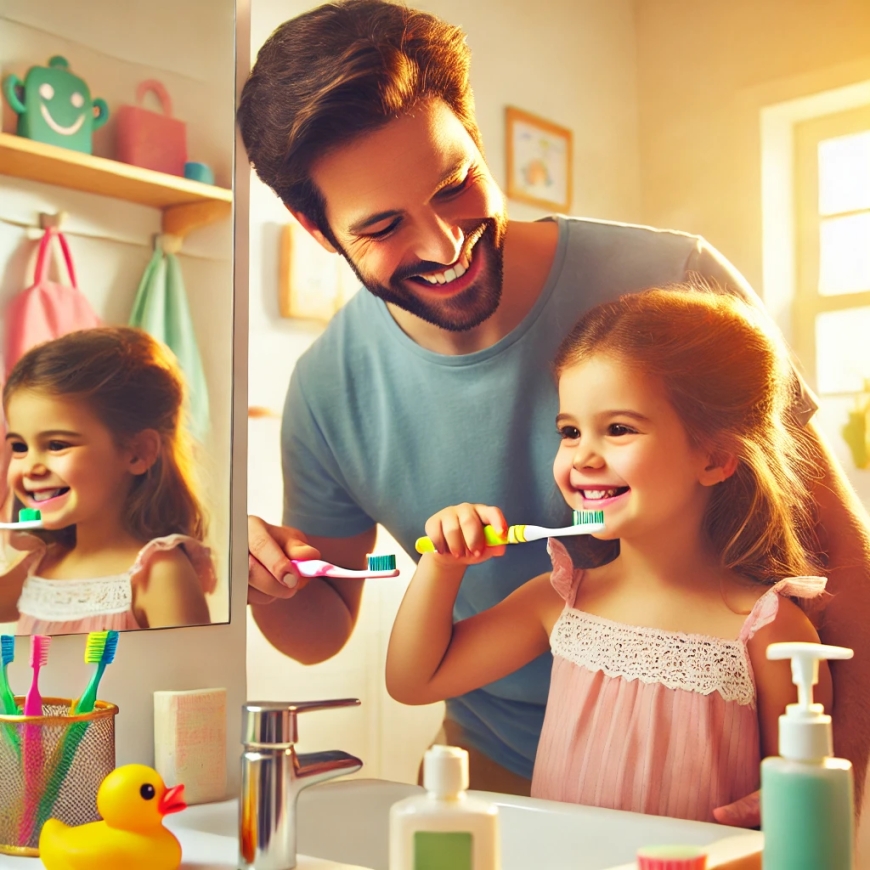The Importance of Dental Hygiene for Children: A Dad’s Perspective
As a father, ensuring that my two girls brush their teeth every morning and every night is a non-negotiable routine in our household. Good dental hygiene is crucial for their overall health, and it's a responsibility that both parents must take seriously. Unfortunately, maintaining consistency in this routine can become a challenge, especially post-divorce or separation. But let’s be clear—if you suspect your ex isn’t enforcing this habit, it’s something that needs to be addressed immediately.

Why Dental Hygiene Matters
Dental hygiene is about more than just a bright smile. The state of a child's teeth can have far-reaching implications for their health, self-esteem, and even academic performance. According to the American Academy of Pediatric Dentistry (AAPD), nearly 60% of children will experience tooth decay by age 5. This isn’t just a minor inconvenience—it’s a health crisis. Untreated cavities can lead to pain, infection, and issues with speaking, eating, and learning.
The Role of Parents in Dental Care
As parents, we have a shared responsibility to instill good habits in our children. Brushing twice a day is one of the simplest yet most effective ways to prevent tooth decay and other oral health issues. But this isn’t just a task to tick off the list—it's a critical part of parenting that requires consistency and attention.
The AAPD recommends that parents start brushing their children’s teeth as soon as the first tooth appears and continue to assist or supervise brushing until the child is at least 7-8 years old. For children between 2-6 years, a pea-sized amount of fluoride toothpaste should be used.
Identifying Inadequate Dental Care
If your children are splitting time between your home and your ex’s, it’s essential to ensure that their dental care routine remains consistent. One of the first signs that their teeth aren’t being brushed regularly is a change in colour. Healthy teeth should be white or slightly off-white. If you start to notice yellowing or even dark spots, this could be a sign that plaque is building up—a clear indicator that their teeth are not being brushed effectively, or at all.
Bad breath is another red flag. While morning breath is normal, persistent bad breath throughout the day can indicate a lack of proper brushing. This is often due to food particles and bacteria remaining in the mouth, leading to odours.
Addressing Concerns with Your Ex
Co-parenting can be challenging, but when it comes to your children’s health, it’s crucial to have open and honest conversations. If you notice signs that your children’s teeth aren’t being brushed regularly, don’t hesitate to bring it up with your ex. Here’s how to approach it:
-
Stay Calm and Non-Accusatory: Begin the conversation by expressing your concern for the children’s health rather than accusing your ex of neglect. For example, "I've noticed the girls' teeth are looking a bit yellow lately. I think we need to make sure they’re brushing every day."
-
Suggest a Routine: Propose a consistent brushing schedule that can be followed in both homes. This can include a morning and evening reminder, or even a brushing chart that the kids can use to track their brushing.
-
Involve the Kids: Encourage your children to take responsibility for their dental hygiene. Make it fun by letting them pick out their toothbrushes or toothpaste. You can also use apps or timers to make brushing more engaging.
The Impact of Neglecting Dental Hygiene
Neglecting dental hygiene can have long-term consequences. According to the World Health Organization (WHO), untreated dental caries (cavities) is the most common health condition globally, affecting around 2.3 billion people. For children, poor oral health can lead to difficulties in school, low self-esteem, and chronic pain.
Moreover, dental issues can escalate into more serious health problems. Bacteria from cavities can enter the bloodstream, potentially leading to infections in other parts of the body, including the heart—a condition known as endocarditis.
Statistics on Children's Dental Health
-
Cavity Prevalence: In the United States, 43% of children aged 2-19 have had cavities in their primary teeth, according to the Centers for Disease Control and Prevention (CDC).
-
Untreated Tooth Decay: About 20% of children aged 5-11 years have at least one untreated decayed tooth.
-
Impact on School: The American Dental Association (ADA) reports that over 51 million school hours are lost each year due to dental-related illnesses.
Practical Tips for Ensuring Good Dental Hygiene
-
Lead by Example: Children are more likely to brush their teeth regularly if they see you doing it. Make brushing a family activity, especially in the morning and before bedtime.
-
Use Rewards: Create a reward system for consistent brushing. Stickers, extra playtime, or a special treat can motivate children to maintain their routine.
-
Regular Dental Checkups: Ensure that your children visit the dentist every six months for cleanings and checkups. Regular visits can catch problems early and reinforce the importance of oral hygiene.
-
Educate Your Children: Teach your kids about the importance of brushing and how it prevents cavities and keeps their smiles bright. Use age-appropriate books, videos, or even a visit to the dentist to help them understand.
-
Choose the Right Tools: Make sure your children are using a toothbrush that is appropriate for their age, with soft bristles and a small head. Electric toothbrushes can also be more effective and fun for kids.
Good dental hygiene is a shared responsibility between both parents. Ensuring your children brush their teeth every morning and night is not just about preventing cavities—it’s about instilling lifelong habits that will benefit them for years to come. If you feel your ex isn’t upholding their end of the bargain, it’s important to address the issue constructively. By working together, you can help your children develop strong, healthy teeth and a confident smile that lasts a lifetime.
What's Your Reaction?


























